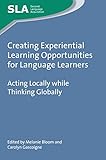Creating Experiential Learning Opportunities for Language Learners : Acting Locally while Thinking Globally / ed. by Melanie Bloom, Carolyn Gascoigne.
Material type: TextSeries: Second Language AcquisitionPublisher: Bristol ; Blue Ridge Summit : Multilingual Matters, [2017]Copyright date: ©2017Description: 1 online resourceContent type:
TextSeries: Second Language AcquisitionPublisher: Bristol ; Blue Ridge Summit : Multilingual Matters, [2017]Copyright date: ©2017Description: 1 online resourceContent type: - 9781783097319
- 9781783097326
- Active learning -- Study and teaching -- United States
- Community and school -- United States
- Experiential learning -- Study and teaching -- United States
- Language and languages -- Study and teaching -- United States
- LANGUAGE ARTS & DISCIPLINES / Study & Teaching
- Experiential language learning
- Experiential learning
- SLA
- Second Language Acquisition
- community-based learning
- experiential language learning in domestic settings
- internships
- language camps
- second language learning
- service-learning
- 418/.0071
- P118.2 .C74 2017
- P118.2
- online - DeGruyter
- Issued also in print.
| Item type | Current library | Call number | URL | Status | Notes | Barcode | |
|---|---|---|---|---|---|---|---|
 eBook
eBook
|
Biblioteca "Angelicum" Pont. Univ. S.Tommaso d'Aquino Nuvola online | online - DeGruyter (Browse shelf(Opens below)) | Online access | Not for loan (Accesso limitato) | Accesso per gli utenti autorizzati / Access for authorized users | (dgr)9781783097326 |
Frontmatter -- Contents -- Contributors -- Introduction -- Part 1: Experiential Learning through Community Engagement -- 1. Multilingual Learners and Leaders -- 2. Community Engagement in Spanish Departments at US Colleges and Universities: Where Is It? -- 3. Civic Engagement and Community Service Learning: Connecting Students' Experiences to Policy and Advocacy -- 4. Service Learning as an Ecological Resource: Providing Learning Opportunities for Mixed Second and Heritage Language Classrooms -- 5. Experiential Learning for L2 Students: Steps Toward a French Service-Learning Program in the Community -- Part 2: Experiential Learning through Professional Engagement -- 6. Externship Opportunities for French: An Initial Response to Pedagogical Climate Change -- 7. Developing Internship Programming for Second Language Students -- 8. Mentors' Perspectives on Professional Internships: Rewards, Challenges and Future Directions -- 9. Internship Programs: A Platform for Locally-based Cultural Immersion Programs -- Part 3: Experiential Learning in Other Local Contexts -- 10. Using Expeditionary Learning Design for Secondary and College-Level World Language Curriculum and Instruction -- 11. Creative Placemaking in Cajun Louisiana: A Multidisciplinary Approach to Teaching and Learning Environmental, Cultural and Linguistic Diversity in the United States -- 12. Engaging Students through Foreign Language Campus Housing: A Case Study of a Small German Language Program -- 13. Language Camps: By Teaching We Learn -- Conclusion: Future Directions in Experiential Learning -- Index
restricted access online access with authorization star
http://purl.org/coar/access_right/c_16ec
While much research has been done on experiential learning opportunities in study abroad settings, there are fewer publications devoted to experiential learning in the domestic context. This volume aims to fill that gap by providing a collection of chapters highlighting research-based innovations in experiential learning in domestic settings. The book focuses on three experiential learning contexts: community engagement experiences, professional engagement experiences and other unique experiential contexts such as language camps and houses. The collection focuses on the US context but the research projects and curricular innovations described here can serve as models for educators working in other local contexts and will encourage interested practitioners to explore experiential learning opportunities in their local areas. It will also provide the reader with a better understanding of this growing field of inquiry and should appeal to graduate students and researchers who are interested in experiential language learning.
Issued also in print.
Mode of access: Internet via World Wide Web.
In English.
Description based on online resource; title from PDF title page (publisher's Web site, viewed 24. Apr 2022)


